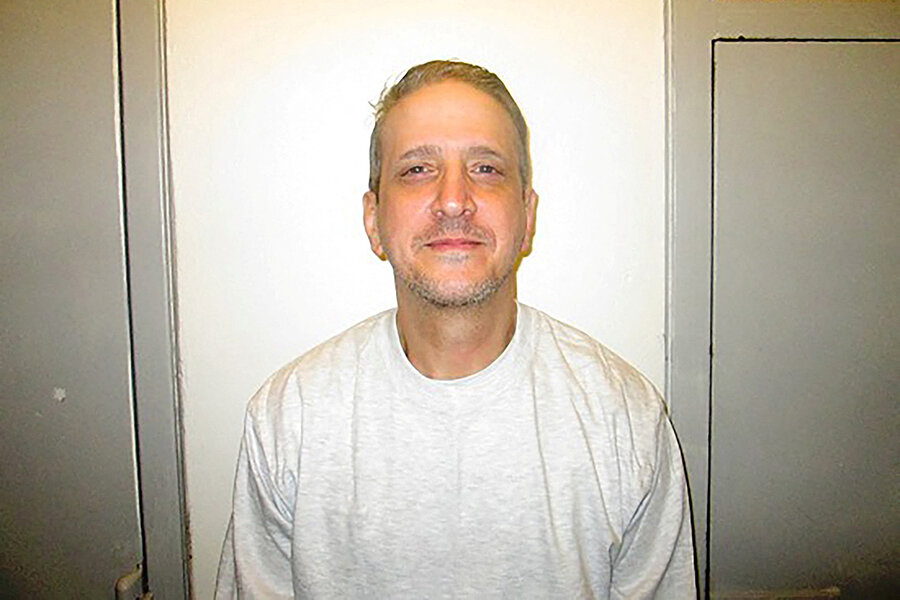Supreme Court doesn’t take many death penalty cases. It took this one.
| Oklahoma City
In debates about the death penalty, one figure looms large on the national stage: Richard Glossip.
Since being placed on Oklahoma’s death row in 1998, Mr. Glossip has been tried twice. He has had nine execution dates. The prisoner has eaten three last meals. He’s been reprieved from execution three times.
The former hotel worker was found guilty of allegedly masterminding the murder of his boss. Mr. Glossip has claimed that he’s innocent. A TV docuseries portrayed his trial as unfair. He’s become a cause célèbre for death penalty skeptics such as Susan Sarandon, Richard Branson, and Kim Kardashian. Mr. Glossip also found an unlikely ally advocating for clemency: Oklahoma’s Republican attorney general. Gentner Drummond submitted a brief to the U.S. Supreme Court arguing that Mr. Glossip did not receive a fair trial.
On Monday, the Supreme Court agreed to hear Mr. Glossip’s case. After a long deliberation, its decision to take up the case took observers by surprise. The conservative court has been reluctant to intervene in death penalty cases.
Mr. Glossip’s case likely doesn’t signal a shift in the court. But it implies that the justices believe that the uncertainties of Mr. Glossip’s case are too extraordinary to ignore. And it comes at a time when, for the first time since the death penalty’s reinstatement in 1976, a majority of Americans say they no longer trust it. Only 47% of Americans say the capital punishment is applied fairly, according to Gallup.
“It sounds as if the court is willing to review this case carefully,” says Robin Maher, executive director of the Death Penalty Information Center, a Washington nonprofit that does not argue for or against the death penalty. “It sends a really strong statement about how important innocence is in death penalty cases.”
Mr. Glossip’s is not the only capital case the justices are being asked to consider. On Thursday, Alabama is scheduled to execute Kenneth Eugene Smith with nitrous gas, a novel form of execution that has only been used on animals before now. In 2022, the state botched an attempt to execute Mr. Smith via lethal injection. His lawyers have petitioned the court, arguing Alabama’s attempt to execute him twice constitutes cruel and unusual punishment.
Ms. Maher points to a Utah case that has the potential to play out in the courts. Utah is planning to execute Ralph Leroy Menzies by firing squad. Mr. Menzies’ lawyers say that the method of execution is identical to a firing squad protocol that was found to be unconstitutional by a South Carolina court.
These cases arise at a moment when a majority of states appear reluctant to carry out the death penalty. Twenty-three states have banned the punishment entirely, while it is effectively defunct in several others. Last year, just five states, including Mr. Glossip’s home state of Oklahoma, carried out executions. Twenty-four people were executed in 2023 – up from a low of 11 in 2021, according to the Death Penalty Information Center’s annual report, but still well below 30. That was the ninth year in a row the number of executions had slipped below that threshold, down from a high of 98 in 1999.
States also appear wary of creating new capital cases: Last year, for the first time, fewer people were sentenced to death – 21 – than were executed.
“Public confidence in the death penalty requires the highest standard of reliability, so it is appropriate that the U.S. Supreme Court will review this case,” Attorney General Drummond said in a statement. “As Oklahoma’s chief law officer, I will continue fighting to ensure justice is done in this case and every other.”
Mr. Drummond isn’t exactly soft on crime. In his first year in office, he’s overseen several executions. But the attorney general filed a brief with the Supreme Court to request that Mr. Glossip’s sentence be vacated so that the case can be retried. The unprecedented brief cited the destruction of evidence and false testimony by the state’s star witness. That witness is the man who actually killed the hotelier whose murder resulted in Mr. Glossip being sentenced to death.
In 1997, a hotel employee named Justin Sneed bludgeoned to death his boss, Barry Van Treese. Prosecutors allege that Mr. Glossip commissioned the murder. They claim that the two men then split several thousand dollars in cash belonging Mr. Van Treese. Mr. Sneed, who wielded the weapon, a baseball bat, is serving a life sentence. He received a lesser sentence in exchange for agreeing to be the state’s key witness against Mr. Glossip. Supporters of Mr. Glossip claim that Mr. Sneed lied under oath. And an independent investigation found that the state not only withheld Mr. Sneed’s records from the trial but also destroyed evidence. In addition, Mr. Drummond’s brief argues that Mr. Sneed’s mental health, and treatment for it – which wasn’t disclosed by the state – is a key point in the case.
Paul Cassell, a lawyer for the Van Treeses, told the Monitor that the family is disappointed.
“The court has granted review, which will probably delay the case for another year,” says Mr. Cassell, a former federal judge and a law professor at the S.J. Quinney College of Law at the University of Utah. “But at the same time, the family is confident that when the court digs into the facts of the case, they’ll see that the Oklahoma Court of Criminal Appeals decided it correctly and that the death sentence should be allowed to move forward.”
Since 2020, there have been nine instances in which the Supreme Court has overruled a lower court to allow executions to proceed, according to a report by Bloomberg Law. Mr. Glossip’s case is one of only two that the court has halted.
Since the documentary “Killing Richard Glossip” came out in 2017, Mr. Glossip has attracted several other unlikely advocates: GOP lawmakers in the Oklahoma Legislature.
For Oklahoma state Rep. Kevin McDugle, a Republican, the death penalty has always been a bedrock value. He says that foundation now has large chinks in it. He helped persuade 28 Republicans and six Democrats in the Legislature to ask the state to reexamine Mr. Glossip’s case.
“The reason this one is different is I don’t think I can name another case where the attorney general says, ‘We can’t kill someone. We can’t trust the first two trials that they’ve gone through. We need to have another hearing,’” state Representative McDugle told the Monitor in a phone call. “And the court systems ignore that and say, ‘No, we’re going to move to execution.’ I mean, that’s unprecedented.”






